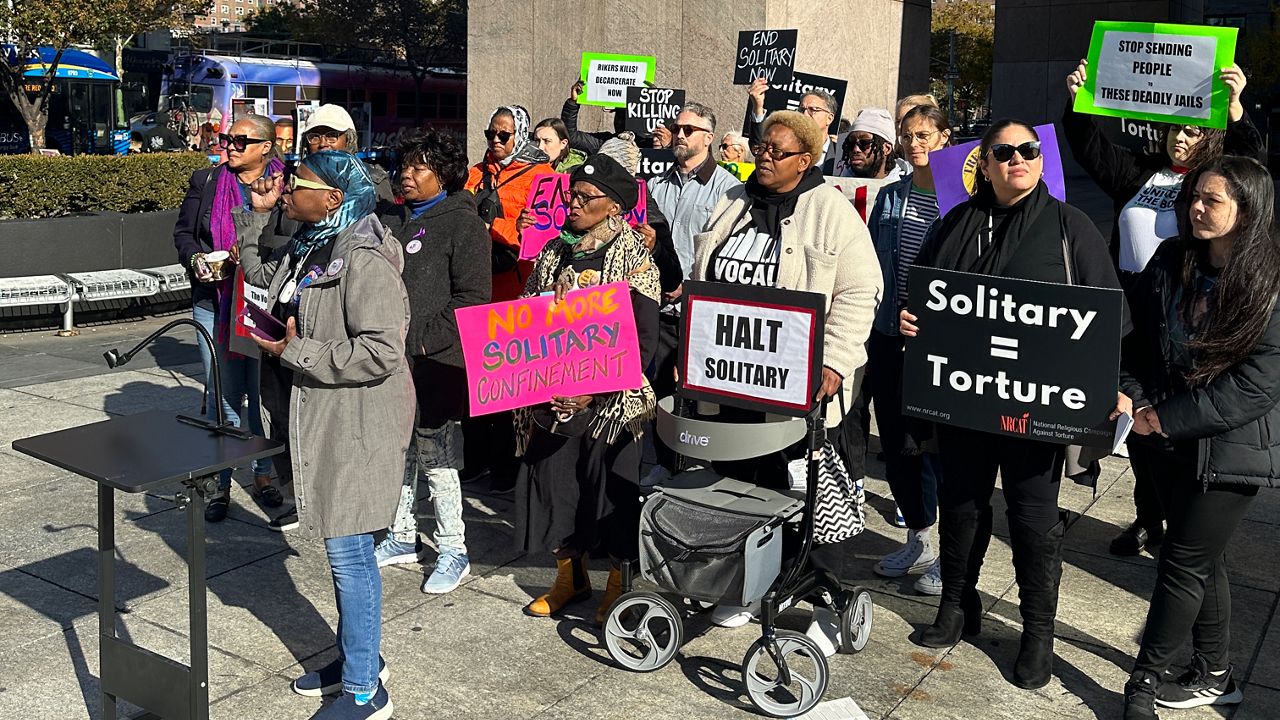Families and advocates say too many detainees are being held in solitary confinement, something they are calling human torture.
A mobile museum highlighting the issue recently took part in a rally to stop the punishment. The Justice Bus Tour rolled into Harlem after making stops in upstate New York and other locations across the county.
What You Need To Know
Advocacy groups and family members of prisoners recently gathered at the Harlem State Office Building on 125th Street to demand an end to solitary confinement
The groups are pushing for Gov. Kathy Hochul to have corrections departments across the state enforce a New York law that forbids long-term solitary confinement
Last month, the Legal Aid Society filed a lawsuit against New York City for keeping people including those with disabilities in solitary confinement on Rikers Island
“We started in California. We’re going to end in Washington, D.C.,” said Rob Connell, of Unlock The Box Campaign. “There’s at least 16 to 18 cities we’re stopping in. The bus has been the centerpiece of so many actions across the country.”
Those actions aim to stop solitary confinement in prisons and jails, as well as improve treatment for those serving their time.
Several advocacy groups and family members of prisoners gathered at the Harlem State Office Building on 125th Street to demand change. The sisters of Franklyn Dominguez told the crowd their brother died during the New York state correction officers strike in February.
“Being starved to death, overdosed on medication, psychosis medication,” Vivian Dominguez said. “To this day, our family still has no answers on how our brother passed away, and we demand justice and we demand accountability and we demand real reform.”
This week, a former correction officer was found guilty of murder in the beating death of inmate Robert Brooks in December of last year. Two COs were acquitted, and five others previously pleaded guilty in the case.
“You were there to make sure that people are serving their time, you’re not there to kill people, you’re not there to torture people, and this is what we have to shine the light on and continue to fight against,” Manhattan state Sen. Cordell Cleare said.
The groups are pushing for Gov. Kathy Hochul to have corrections departments across the state enforce a New York law that forbids long-term solitary confinement. It’s called The HALT Act, the Humane Alternatives to Long-Term Solitary Confinement.
Johnny Perez works with the National Religious Campaign Against Torture. He says he was placed in solitary confinement on Rikers Island and at several state facilities.
“Twenty-three hours a day for three years straight, or 1,100 days I was locked in a cell that I can basically reach out and touch both walls,” Perez said.
The governor’s deputy press secretary sent a statement to NY1 in response to the rally and advocates’ concerns.
“Governor Hochul has made it clear that the safety and security of everyone who enters our correctional facilities — both employees and incarcerated individuals — is a top priority. The Governor has implemented a number of new initiatives within DOCCS to begin making significant systemic changes following the horrific murder of Robert Brooks, and this administration remains committed to working with the Legislature to improve the prison system for all,” said Jess D’Amelia.
Advocates who gathered say they understand violent detainees should be separated from the general population behind bars, but they say there has to be more than just that.
“To be clear, the solitary confinement bill basically says that nobody can be held in long-term solitary confinement beyond 15 days,” said Victor Pate of the HALT Solitary Campaign. “What happens after the 15 days is that they be transferred to a specifically designed unit, residential rehabilitative unit where people are not just isolated 23 to 24 hours of the day.”
Last month, the Legal Aid Society filed a lawsuit against New York City for keeping people including those with disabilities in solitary confinement on Rikers Island.

